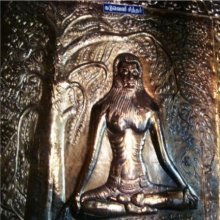Kaduveli: 1 definition
Introduction:
Kaduveli means something in Hinduism, Sanskrit, the history of ancient India. If you want to know the exact meaning, history, etymology or English translation of this term then check out the descriptions on this page. Add your comment or reference to a book if you want to contribute to this summary article.
Images (photo gallery)
In Hinduism
Shaivism (Shaiva philosophy)
Source: DSpace at Pondicherry: Siddha Cult in Tamilnadu (shaivism)Siddha Kaduveli refers to one of the later siddhars in the traditional classification.—Kaduveli Siddhar is often referred in some of the lists of eighteen Siddhas and in some of the scholarly works he was accommodated in the lists of latter Siddhas. He authored 34 stanzas in a folk song meter, stressing various features of worldly life. He believed to have lived in 16th and 17th centuries C.E.

Shaiva (शैव, śaiva) or Shaivism (śaivism) represents a tradition of Hinduism worshiping Shiva as the supreme being. Closely related to Shaktism, Shaiva literature includes a range of scriptures, including Tantras, while the root of this tradition may be traced back to the ancient Vedas.
India history and geography
Source: Shodhganga: Siddha Cult in TamilnaduKaduveli refers to one of the various famous Siddha Centre distributed throughout South India and Tamil Nadu. The Siddha cult represents a Tantric philosophy that emerged from the combination of several elements found in traditions such as Shaivism (viz., Pashupata), Shaktism, Jainism, Tantric Buddhism (Vajrayana), etc. Both the Siddha and the Navanath cult (i.e., Nava-natha, ‘nine saints’) are popular in South India [viz., Kaduveli] and Tamilnadu. A Siddha was an inspired seer belonging to the marginalized sections of society who dissolved their past karma and crushed the roots of future karma.

The history of India traces the identification of countries, villages, towns and other regions of India, as well as mythology, zoology, royal dynasties, rulers, tribes, local festivities and traditions and regional languages. Ancient India enjoyed religious freedom and encourages the path of Dharma, a concept common to Buddhism, Hinduism, and Jainism.
See also (Relevant definitions)
Starts with: Katuveli.
Ends with: Katuveli.
Full-text: Irumbai.
Relevant text
No search results for Kaduveli; (plurals include: Kaduvelis) in any book or story.
